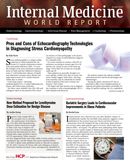Publication
Article
Internal Medicine World Report
Hypotension in Hospitalized Heart Failure Patients is Associated Higher Mortality Rate
Author(s):
Heart patients who have bouts of hypotension while hospitalized for acute decompensated heart failure (ADHF) have an increased risk of an adverse outcome within 30 days, a multi-institutional study found. Priyesh Patel, MD, and colleagues, writing in Circulation reported on their analysis of results of the ASCEND-HF study.

Heart patients who have bouts of hypotension while hospitalized for acute decompensated heart failure (ADHF) have an increased risk of an adverse outcome within 30 days, a multi-institutional study found. Priyesh Patel, MD, and colleagues, writing in Circulation reported on their analysis of results of the ASCEND-HF study. Their goal was to find which factors might be associated with development of in-hospital hypotension and whether that hypotension had an effect on patients’ 30-day outcomes.
Overall, 21.8% of 7,141 patients in the study had an episode of hypotension, thought 73.1% showed no symptoms.
The team found that the hypotension was strongly associated with patients taking nesiritide (Natrecor/Sandoz), getting chronic metolazone (Zarolxolyn) therapy, or having baseline orthopnea.
They also found that the presence of in-hospital hypotension was an indication that these patients were more likely to die or be hospitalized for heart failure within 30 days.
Even a short episode of hypotension during a hospital stay can diminish the blood flow to vital organs, Patel noted. Previous studies have shown large drops in blood pressure are associated with declines in renal function in ADHF patients, he said.
In the ASCEND-HF study nesiritide therapy led to higher rates of hypotension vs. placebo, but it had no effect on mortality or rehospitalization.
The researchers sought to look at overall outcomes associated with in-hospital hypotension.
They limited their study to episodes of hypotension within the first 48 hours of admission.
Nearly two-thirds of patients with hypotension episodes were randomized to nesiritide therapy. But analysis showed that getting nesiritide did not alter the relationship between hypotension and 30-day outcomes.
Chronic bumetanide therapy and pre-randomization calcium channel blocker therapy were less associated with hypotension.
Overall, patients who had the low blood pressure episodes while in the hospital were more likely die, and become rehospitalized than those who did not. Those who had symptomatic episodes were more likely to die than those without symptoms.
“Physicians should use caution when using or studying vasoactive therapies that can lower blood pressure,” Patel wrote. They should also try to avoid triggering it, detecting it early and correcting it.
“While it is easy to ignore an asymptomatic episode of hypotension, the strong association of hypotension with adverse 30-day outcomes should give pause and compel a thoughtful tailed approach to risk stratify and mitigate every patient’s risk for negative outcomes. That includes using neurohormonal therapies and device therapies prior to hospital discharge.
But future studies are needed to further clarify just why episodes of hypotension are associated with unfavorable outcomes.
The ASCEND-HF study was supported by Johnson & Johnson. Patel’s work was supported by the National Institutions of Health and Duke Clinical Research Institute.






